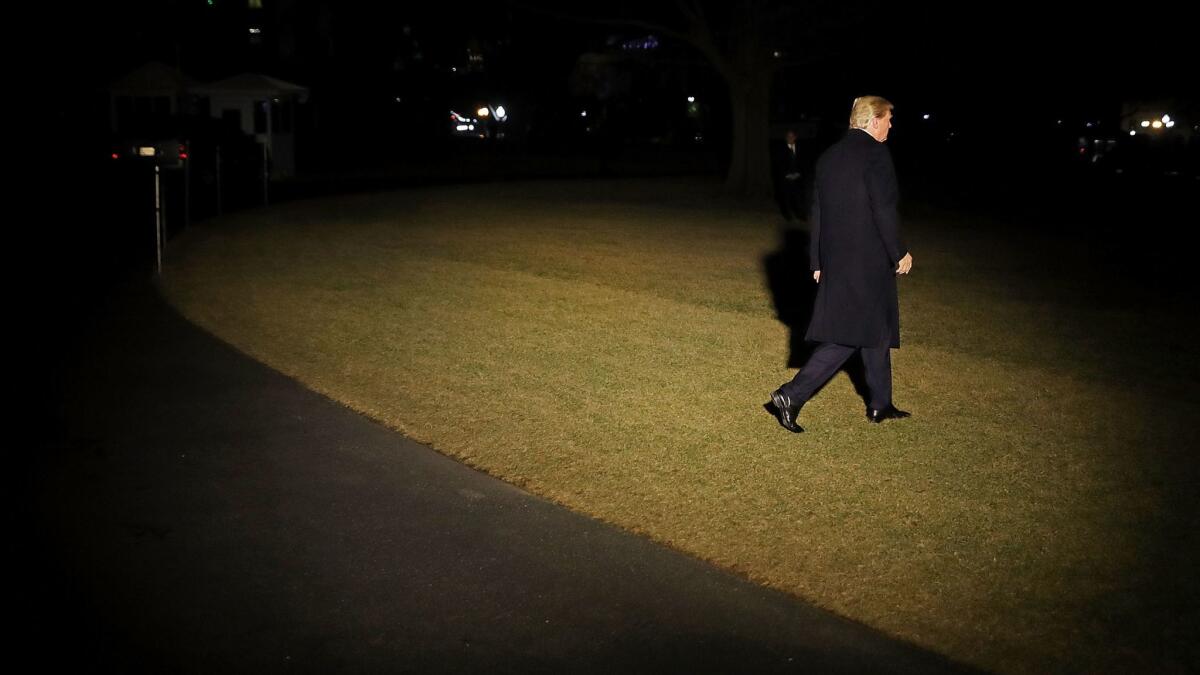Here’s what President Trump has done to impede and control the Russia investigation

Has President Trump obstructed justice? It’s a question that has consumed and divided Washington for months as critics accuse the president of tampering with the continuing Russia investigation.
Although lawyers and scholars disagree on the legal questions involved, a clear pattern has emerged of Trump trying to influence the case’s outcome. The latest reminder came from Thursday’s reports that last year Trump ordered the firing of special counsel Robert S. Mueller III, who’s leading the probe, but backed down after the top White House lawyer threatened to quit.
Trump seems to have his own view of the issue of obstruction, suggesting on Wednesday that he’s just trying to defend himself against an unfair investigation. Since no one can prove his campaign colluded with Russians trying to influence the presidential election, he said, “now they’ll say ‘Oh, well, did he fight back? Fight back — oh, it’s obstruction of justice.’”
Here’s what Trump has done or been accused of doing since taking office.
February 2017
Seeking leniency for his former national security advisor
One day after Trump ousted Michael T. Flynn as his national security advisor, the president had a private meeting with FBI Director James B. Comey. At the time, Flynn was under investigation for lying about his contacts with the Russian ambassador, a case that would eventually lead to his guilty plea in December.
Comey later told Congress that Trump asked him to back off.
“I hope you can see your way clear to letting this go,” Comey quoted the president as saying. Trump has denied trying to intervene on Flynn’s behalf.
March 2017
Asking intelligence officials to intervene
Trump continued looking for ways to shield Flynn from the investigation into whether anyone from his team helped Russian attempts to meddle in the 2016 election, according to the Washington Post. After a White House briefing, Trump reportedly asked the director of national intelligence, Daniel Coats, and CIA Director Mike Pompeo to talk with Comey about reducing the FBI’s focus on Flynn.
March 2017
Trying to keep his attorney general on the case
Atty. Gen. Jeff Sessions faced mounting pressure to step aside from any role overseeing the Russia investigation after Congress found out that he had failed to disclose his own contacts with Russian officials. But Trump wanted his political appointee to stay in charge and directed White House Counsel Don McGahn to talk Sessions out of it. The attempt wasn’t successful, and Sessions recused himself.
May 2017
Firing the FBI director
Trump shocked Washington by ousting Comey. The White House initially said the president made the decision after consulting with top Justice Department officials who felt Comey had mishandled the investigation into Hillary Clinton’s private email server.
But Trump later told NBC news that “this Russia thing” was on his mind when he fired Comey. The episode caused a political outcry that quickly led to the appointment of Mueller as a special counsel to lead the investigation.
June 2017
Ordering the firing of the special counsel
One month after Mueller was appointed, Washington was awash with rumors that the president would try to fire him. Trump’s friend Christopher Ruddy said publicly that he was considering it, and the president tweeted his anger over the investigation.
But it wasn’t until this week that the New York Times reported that Trump had asked McGahn to fire Mueller. McGahn reportedly threatened to quit, and Trump backed down, leaving Mueller in place. The White House declined to comment on the story, which Trump called “fake news.”
July 2017
Drafting misleading statement
News that Trump’s son Donald Jr., son-in-law Jared Kushner and then-campaign chairman Paul Manafort had met during the campaign with a Russian lawyer offering incriminating information about Hillary Clinton presented a challenge for a White House struggling to swat away allegations of collusion. Trump Jr. initially claimed that the meeting was about policies involving the adoption of Russian children, but that was false. The White House later confirmed that the president, himself, helped write the inaccurate statement.
More to Read
Get the L.A. Times Politics newsletter
Deeply reported insights into legislation, politics and policy from Sacramento, Washington and beyond. In your inbox three times per week.
You may occasionally receive promotional content from the Los Angeles Times.










